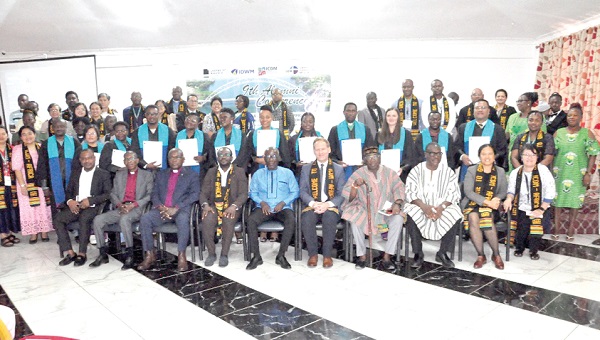
Commit more resources towards addressing community health needs — PCG Moderator
The 9th Annual International Alumni Conference of the International Community of Diaconic Management (ICDM) ended in Ho yesterday, with a renewed call on religious organisations to commit greater zeal and resources towards addressing the health needs of the people.
The Moderator of the Presbyterian Church of Ghana (PCG), Rt Rev. Dr Abraham Nana Opare Kwakye, in speech read on his behalf, said in spite of efforts of the government to cushion citizens who seek medical through the national health insurance scheme, the cost of health care was still expensive.
“Some are not able to pay the premium for the National Health Insurance, many people are dying in our communities due to lack of adequate health facilities, and many people are not able to meet the high cost of health care, “he added.
The four-day event, hosted by the Evangelical Presbyterian College/Seminary, was on the theme: “Universal health coverage and welfare (SDG 3.8): towards post COVID-19 responses, challenges, key strategies and role of health and religious institutions within global contexts’’.
The conference was in collaboration with the German Academic Exchange Service (DAAD), Institute for Diaconic Science and Diaconic
Management of the Bielefeld University in Germany, United Evangelical Mission, with funds from the Federal Ministry for Economic Cooperation and Development (BMZ).
Participants
It was attended by about 50 participants from Ghana, the Philippines, Germany, Rwanda and DR Congo.
Others were from Cameroun, South Africa, Indonesia Tanzania and Hong Kong.
The topics included: Resource allocation and impact of the COVID-19 pandemic on social work in Ghana, Multi-sectoral approach after pandemic; Working conditions during COVID-19 pandemic, overcoming the pandemic, and the Role of traditional medicine in and after the pandemic in Ghana, and others.
Rt Rev. Dr Kwakye said the Presbyterian Church of Ghana currently could boast 60 health facilities across the country with more than 4,000 staff.
“These health facilities include four major hospitals, five midwifery and nurses training colleges, and a psychiatric hospital,” said the moderator.
In the area of education, Rev Kwakye said, PCG had 2,450 basic schools, 32 senior high schools, two vocational institutes, five colleges of education and two fully-chartered universities.
The church also have agricultural stations in some parts of the country, which did not only teach farmers scientific methods of farming but also produce food for the country, he said.
“The stations, and three social services units also create jobs for the citizens,” added Rt Rev. Dr Kwakye.
The Volta Regional Minister, Dr Archibald Yao Letsa, hailed the conference as timely and critical as it highlighted the critical intersection between health and wellbeing, with the role of religious and health institutions in navigation the post-pandemic world.
He said COVID-19 had brought unprecedented challenges to global health systems, economies and the social fabric of societies.
“Yet, it has also given us valuable lessons and opportunities for the reimaging of healthcare delivery systems, while underscoring the importance of robust health and the need for universal health coverage,” Dr Letsa told the conference.
The ICDM was founded in 2015 to serve as a platform for continuous learning for its members as well as for building a stronger network for exchanging ideas, sharing experiences, supporting each other and collaborating with academics and practitioners in the field of humanitarian work to serve the deprived with love and professionalism.
